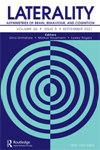下一个十年的横向性:计算行为学和寻找认知不对称的最小条件。
IF 0.9
4区 心理学
Q4 PSYCHOLOGY, EXPERIMENTAL
引用次数: 6
摘要
在对Ocklenburg等人的论文的评论中,我强调了计算行为学可以为准确跟踪各种物种的偏侧行为提供的贡献;我还讨论了当前对所谓的“最小认知”的兴趣如何有助于理清大脑和行为不对称的共享机制和物种特异性机制。本文章由计算机程序翻译,如有差异,请以英文原文为准。
Laterality for the next decade: Computational ethology and the search for minimal condition for cognitive asymmetry.
In this comment to Ocklenburg et al.'s paper I stressed the contribution that computational ethology can provide to the accurate tracking of lateralized behaviour in a variety of species; I also discussed how current interest in so-called «minimal cognition» may help to disentangle shared and species-specific mechanisms of brain and behavioural asymmetries.
求助全文
通过发布文献求助,成功后即可免费获取论文全文。
去求助
来源期刊

Laterality
Multiple-
CiteScore
3.60
自引率
7.10%
发文量
26
期刊介绍:
Laterality: Asymmetries of Body, Brain and Cognition publishes high quality research on all aspects of lateralisation in humans and non-human species. Laterality"s principal interest is in the psychological, behavioural and neurological correlates of lateralisation. The editors will also consider accessible papers from any discipline which can illuminate the general problems of the evolution of biological and neural asymmetry, papers on the cultural, linguistic, artistic and social consequences of lateral asymmetry, and papers on its historical origins and development. The interests of workers in laterality are typically broad.
 求助内容:
求助内容: 应助结果提醒方式:
应助结果提醒方式:


